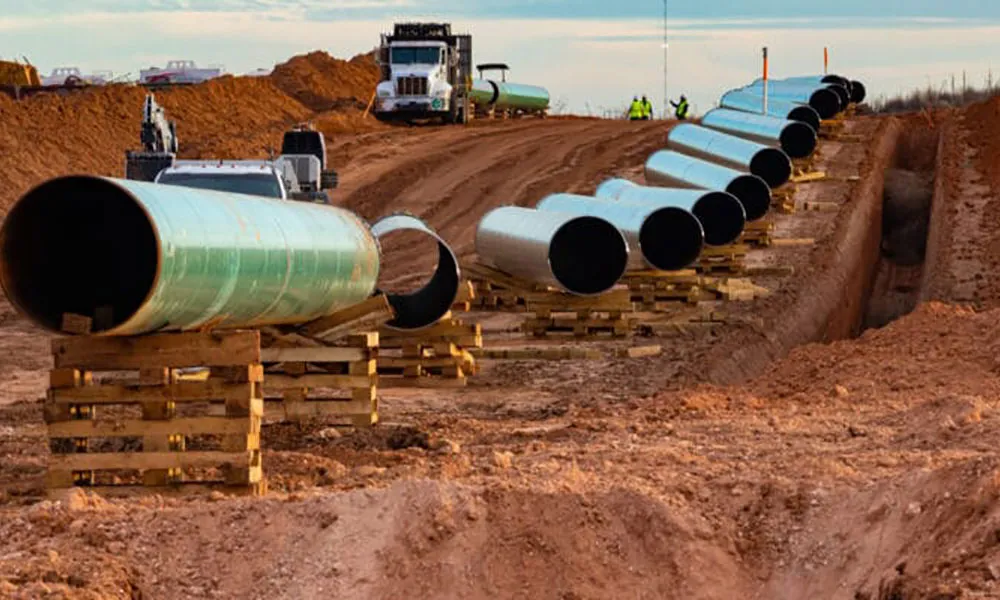Tanzania has brazenly stood by and backed the ambitious East African Crude Oil Pipeline (EACOP) Project championed by Uganda after facing pushback from the European Union (EU) Parliament.
The EU parliament has spotlighted the project on allegations of human rights violations and significant environmental and climate risks posed by the oil pipeline project.
As a deliberate attempt to swat the EU’s “neo-colonial” setbacks, Tanzania, as one of the stakeholders via the ministry of energy, has issued a statement addressing the situation. The ministry unequivocally said it is “seriously concerned by grave factual misrepresentations in the resolution issued by EU Parliament.”
- Uganda, which is the primary project implementer, has remained stern on executing the oil pipeline
- Tanzania’s ministry of energy has exposed equal and fair compensation modalities to affected communities
- Despite every needed environmental assessment by international standards, still, some risks are unavoidable; the ministry of energy said
According to the ministry statement, Tanzania has issued crystal-clear clarifications before the global stage as the nation ushers new dawn in the business environment and investment ground.
The EU has urged the project development to be changed. This includes the shocking suggestion of re-routing the pipeline alignment to avert climate, human rights and environmental shocks.
READ: Construction of world’s largest heated crude oil pipeline begins in Uganda
What does Tanzania say?
The ministry argued that the oil pipeline project is being implemented strictly on international safety, environmental and social aspects, including the Human Rights Impact Assessment (HRIA).
The EACOP project has managed to amass at least US$20 billion, benefiting the two neighbouring nations immensely. That’s why Tanzania is stern on highlighting key issues regarding human rights and environmental risks.
“A dedicated HRIA was undertaken as part of the project implementation process. The HRIA assessed and put in place measures for addressing the potential adverse of the project on the human rights enjoyment,” the statement pointed out.
According to the EU Parliament statement, at least 100,000 people have been forced to move out of their homes to leave the path for the pipeline.
However, the EU argued that these communities have been robbed of their lands and left without fair and equitable compensation.
“Calls for the EU and the international community to exert maximum pressure on Ugandan and Tanzanian authorities, as well as the project promoters and stakeholders, to protect the environment and to put an end to the extractive activities in protected and sensitive ecosystems,” the EU reads part of the resolution
As a deliberate response to the concerning statement, the energy minister January Makamba argued that at some point, some aspects of physical displacement and the economic impact couldn’t be avoided.
However, he refuted the unequal compensation statement by saying, “The project will access no land until compensation has been paid and notice to vacate has been given. In fact, eligible Project Affected Persons (PAPs) will also be entitled to transitional food support and have access to livelihood restoration programmes. The land acquisition process is expected to be completed in mid-2023,” he said.
Further on that line, the ministry has stood firm and aligned its professional take on the matter, noting that the oil pipeline route is structured and designed to minimize environmental and social impacts and physical displacement and render low economic effects on nearby communities.
Contrary to the EU statements, the government of Tanzania has explicitly expressed the progress and nature of relocation. The minister argued that nearly 85 per cent of PAPs have elected for replacement housing and construction of these replacement houses is in progress.
From a human rights standpoint, the ministry pointed out a clear-cut process that is somewhat aligned well with every rule and regulation in the book.
“The project will access no land until compensation has been paid and notice to vacate has been given. In fact, eligible PAPs will also be entitled to transitional food support and have access to livelihood restoration programmes. The land acquisition process is expected to be completed in mid-2023.” Minister Makamba.
This contention coming at the oil pipeline project isn’t the first one. Over the past year, other global activists have rallied against the pipeline and challenged the project financing.
READ: Lack of commitment costs Kenya a slot in EACOP
Uganda’s take
Uganda—the primary implementer of the project, has provided a rather stern statement regarding the pressure waived by the EU.
The project, which draws significant oil and gas companies, including TotaEnergies, is faced with many uncertainties on its fate –forcing the Ugandan government to play its cards right.
“We should remember that TotalEnergies convinced me about the pipeline idea; if they choose to listen to the EU parliament, we shall find someone else to work with”, Ugandan President Yoweri Museveni (Upstream Online).
In a nutshell, TotalEnergies said that, as sovereign states, Uganda and Tanzania have the right to make their own strategic choices when it comes to exploiting their resources and developing their economies (Upstream Online).
